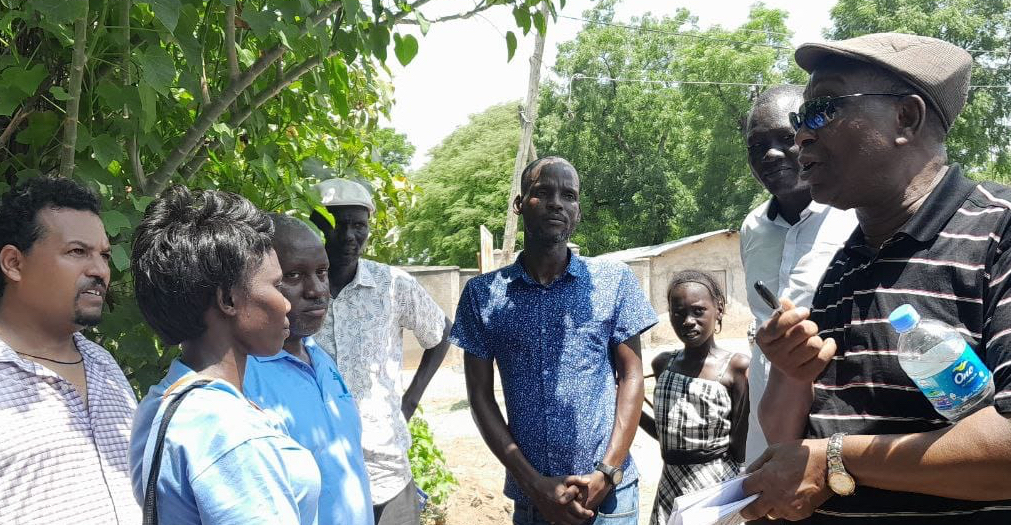Taking the Nile Basin Discourse to the next level
Posted in : Latest on 12 February 2025
Without nature, we are nothing,” says Sylvester Matemu, who became head of the Nile Basin Discourse in 2024. “Without nature, we cannot do anything.

That perspective underlies Matemu’s passion for protecting water resources and involving communities in gathering data about water and adapting to climate change.
CIWA previously supported NBD with projects totaling over US$5 million and is currently developing a US$2.5 million grant to enhance community engagement at the grassroots level for climate resilience. Through capacity building and other activities, the new project will engage communities in water and climate data generation to enhance water resources management planning, disaster preparedness, and cooperation. NBD is committed to increasing the participation of women in climate action and water policy decision making because it can facilitate the creation of more sustainable climate-resilient communities.
A well-rounded career in the water sector
Matemu, 66, is well-positioned to take the helm of the NBD as its regional manager. He has worked on water issues from several vantage points—including at the governmental and nongovernmental levels.
Matemu worked for 27 years in the public water sector of his home country, Tanzania, including as assistant director in the Ministry of Water, where he coordinated negotiations on transboundary water agreements and supervised the preparation and execution of transboundary management and development plans.
He most recently was the NBI’s executive director and served as president of the African Network of Basin Organizations.
A civil engineer, Matemu also has a master’s degree in international and national water law. He recently published a book, the Legal Obligations and Challenges to ManageNileTransboundaryWaters.
Matemu’s dedication to improving transboundary water resources cooperation also stems from the fact that Tanzania shares 14 water bodies with its eight neighbors—the highest number of shared water bodies in SSA.
Cooperation, therefore, is not an option, he says, it’s imperative.
A model for other river basins
“Governments alone will not be able to achieve water resources management without involving communities,” he says. “Empowering citizens will strengthen cooperation and sustainability in the Nile Basin.”
Matemu’s vision for the NBD is to “ensure that it becomes an example on the African continent of advocating for communities, not only through top-down dialogue—bringing policies down to citizens—but also through bottom-up” communication.
“I want NBD to become No. 1 in Africa in civil society engagement and working closely with policymakers,” he says.
Matemu says that a strength of the NBD is its relationships with the 10 Nile Basin governments through the national Nile Discourse Forums, comprising the more than 600 civil society organizations (CSOs) and non-governmental organizations in the NBD network.
The NBD’s primary challenge has been strengthening its financial sustainability. Along with support from other development partners, the new CIWA grant will help NBD continue elevating the voices of communities to policymakers while striving for greater financial stability. “I want to thank the World Bank, and CIWA in particular, for supporting NBD and NBI,” Matemu says.
Strengthening climate adaptation
The Nile basin faces many challenges including surging populations, poverty, rapid urbanization, uneven resource distribution, deteriorating water quality, disappearing ecosystem habitats, and worsening climate change. These challenges compromise the health, livelihoods, and lives of more than 272 million people living within the basin, with women being impacted at disproportionately higher rates than men.
Given these challenges, a sustainable Nile basin can only be achieved if governments, civil society, the private sector, and communities work together toward a common vision on climate change interventions, he says, including aligning policies with community priorities. NBD serves as a conduit between policymakers and local communities on the critical issue of climate change resilience.
Matemu says that many people have indigenous knowledge about how to adapt to climate change. For example, animals can sense certain atmospheric signals that foretell earthquakes and, by observing their behavior, their owners can prepare.
But many communities need capacity building to strengthen their climate resilience skills, and that is precisely what the new CIWA grant plans to do. The project will generate citizen data on water and climate change to inform national and transboundary policies. And when communities produce information, they are more likely to take ownership of climate change mitigation and resilience measures. NBD plans to work with a foundation to develop citizen science data tools.
The new project will improve stakeholder dialogue and action through a gender equality and social inclusion lens by strengthening and sustaining national and regional Nile Women Networks, establishing national Nile youth platforms and a regional youth network, scaling up NBD’s internship program, and bolstering relationships with other institutions.
“Every citizen has a responsibility to protect what we have,” Matemu says. “Otherwise, we will be a water desert where you can see water, but you cannot use it, where you will find water flowing, but you cannot drink it because it is polluted. We need to protect this precious resource that we have for our livelihoods, for our ecosystems, for our economies, for our health, and for our present and future generations.”


